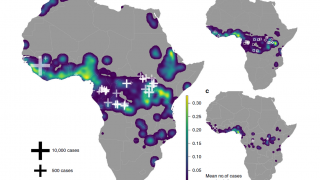Know Your Zika Risks Before You Go

The Zika virus continues to be a problem in many parts of the world, which makes a decision to visit certain countries complex, says the Centers for Disease Control and Prevention (CDC) on March 14, 2019.
And the CDC is alerting USA travelers about the Zika outbreak in India.
To make an informed travel decision, the CDC has published an interactive map which contains the most up-to-date Zika information.
In making this decision, the CDC says to consider your ability to protect yourself from mosquitoes, since Zika is spread mostly by the bite of an infected Aedes species mosquito.
Because there is no preventive vaccine or treatment for Zika, people living in areas with Zika should take steps to prevent infection.
This is important information since the only Zika cases reported in the USA have been related to international travel during 2019.
The best place to avoid these infectious mosquitoes is above 6,500 feet of elevation.
Moreover, an infected man or woman can spread Zika through sex, even if he or she does not have symptoms. This means, to prevent the spread of Zika, use condoms every time you have sex, says the CDC.
And, the CDC recommends that pregnant women and couples planning a pregnancy within the next 3 months consult with a healthcare provider in making international travel decisions.
This recommendation is based on the fact that the Zika virus can be passed from a pregnant woman to her fetus.
And Zika can cause serious birth defects in babies born to women who were infected with Zika virus during pregnancy.
Microcephaly is one of the possible birth defects, in which a baby’s head is smaller than expected when compared to babies of the same sex and age. Babies born with microcephaly often have smaller brains that might not have developed properly.
Additionally, Congenital Zika syndrome is a unique pattern of birth defects found among fetuses and babies infected with Zika virus during pregnancy.
Current CDC research suggests that Zika also is strongly associated with Guillain-Barré syndrome (GBS), a rare disorder that can cause muscle weakness and paralysis for a few weeks to several months.
Only a small proportion of people with recent Zika virus infection get GBS. Most people fully recover from GBS, but some have permanent damage.
There may be good news regarding a preventive Zika vaccine soon. Several Zika vaccine candidates have been in the news:
- Zika Vaccine Candidate TAK-426 Receives FDA Fast Track Designation
- Zika Vaccine Candidate Begins Human Testing
- Nebraska Team Joins the Zika Vaccine Race
- Zika Vaccine Candidate Leverages Yellow Fever Vaccine
- Zika Vaccine Candidate Meets Phase 1 Study Endpoints
Our Trust Standards: Medical Advisory Committee




